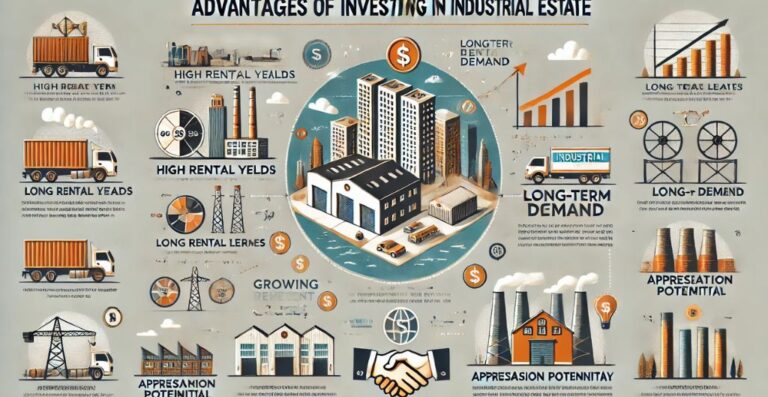Decoding Real Estate Asset Classes and Property Types
What is an Asset Class?
According to Wikipedia, an Asset Class can be defined as “a group of marketable financial assets that have similar financial characteristics and behave similarly in the marketplace.”
Assets classes are usually divided into 5 broad categories:
- Stocks or equities
- Bonds or other fixed-income investments
- Cash or cash equivalents
- Real estate
- Marketable commodities
Understanding the Real Estate Asset Class
Real Estate refers to the land and any structures, such as buildings, attached to it. As simple as that. It plays a crucial role in the economy. Today, real estate is one of the most popular alternative investments. Investing in real estate offers opportunities for income, capital appreciation, and diversification.
Real estate can be purchased for personal use, leased to generate income, or held as a long-term investment. For the investors to understand the investment properties effectively, the real estate asset class is divided into property type and property classes.
What are Property Types?
Understanding property type real estate is essential for anyone looking to invest wisely and align their goals with the right asset class.
The real estate asset class is divided into 3 main Property Types.
- Residential Real Estate
- Commercial Real Estate
- Land Properties Real Estate
Residential Real Estate: Any property used for residential purposes, such as apartments, villas, independent houses, or flats, comes under the Residential Property Type. When these properties are used for cash flow, i.e., rented, they are regarded as investment property.
Commercial Real Estate: Commercial Property Type is simply the real estate intended to be used for business purposes, such as offices, hotels, warehouses, retail stores, shopping complexes, and industrial spaces.
Land Properties Real Estate: The land upon which all other types of properties can be built further comes under the Land Property Type. It can either be used for agricultural purposes or non-agricultural purposes such as residential or commercial real estate.
What are Property Classes?
There are 3 Property Classes: Class A, B, and C. These classes help identify the properties of the particular real estate, in terms of various degrees of risks and return on investments. These property classes are assigned to real estate based on their age, location, physical condition, and potential to generate income.
Each class represents a different level of risk and return. These property classes have a great influence on the stability of an investment over time. There is no precise formula as to how each property is placed under a property class. It is upon the investors to understand and align them with their own strategy and goals of investment.
Class A: The generally new buildings that have been built in the last 15 years fall into this category. They have the highest rate of return with almost no maintenance required.
Class B: These are a bit older than the Class A properties. These properties are at a slightly higher risk than Class A, but their value can be increased.
Class C: These are typically older buildings, more than 20 years old. They are in need of renovation and they comparatively give very low returns.
Factors to Consider When Investing.
Location: Study the proximity of infrastructures from the desired real estate. For example, if you are looking for a residential place, facilities such as hospitals, local stores, schools, etc., should be easy to access. If you are looking for real estate for commercial uses such as manufacturing, transportation hubs should be in proximity for running a smooth operation. Study the market trends and neighborhood trends before making an investment.
Budgeting: Assess your financial capacity and funding options such as loans and down payments. Include additional costs such as maintenance, taxes, and insurance in your budget.
Purpose of Investment: What is the purpose of your investment? Are you looking to invest in a house for personal use or something you can rent out for stable cash flow? Or do you want to set up a warehouse for a business? Match your purpose with the type of real estate to invest in. Residential for rent, industrial for business, etc.
Legal and Zoning Regulations: Understanding local zoning laws and building codes is very essential. These laws define what can be legally carried out in the area and what can inflict fines. Verify property titles and permissions to avoid disputes.
Market Trends and ROI: Study the real estate market before making an investment. Also, analyze the return on investment and the maintenance.
Property Condition: Check for structural integrity and quality of construction. The property classes will be of help here. Evaluate all on-site amenities and future repair costs as well.
Risk Assessment: Consider risks such as market volatility, vacancies, and property devaluation before making the final decision. Mitigate your risks by diversifying investments across asset class.
Conclusion:
Real estate asset class and property types are a world of opportunities for investors, businesses, and individuals alike. However, with each class of real estate comes unique characteristics and unique factors influencing its value which when understood can lead to better decisions and great returns in the future.
It is important to know whether one is looking forward to investing in residential, commercial, industrial property, or specialized properties. It is important to get the right investment in place. It is well understood that in this ever-changing society and economy, flexibility and forward-thinking are crucial. One can also identify great prospects by examining each trend and understanding the dynamics of each asset class. The real estate market will always change so if you remain focused and pragmatic, you’ll be ready for action when good possibilities emerge.
FAQs:
What are the types of assets in real estate?
Ans.
• Commercial real estate asset classes. These property types include retail spaces, hospitals, offices, nursing homes, and storage facilities are all considered commercial.
• Residential real estate assets. Duplexes, apartment buildings, multifamily housing, condos, tiny home investing, and student housing fall under this property type.
• Land ownership assets. Any land that’s purchased, sold, and rented out is considered a real estate asset.
What are real assets vs real estate?
Ans. A real asset is a tangible investment that has an intrinsic value due to its substance and physical properties. Whereas, real estate is a term that refers to the physical land, structures, and resources attached to it.



































